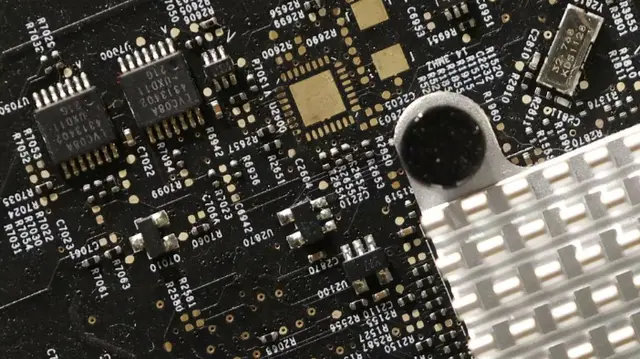The worry over unstable supply of chips has been spreading to the global and heating up the gnarly chip competition as EU strode to have chipmaker TSMC committed to set up a factory in Germany.
The chipmaker committed 3.5 billion euros ($3.8 billion) to a factory in Germany, its first in Europe, taking advantage of huge state support for the $11 billion plant as the continent seeks to bring supply chains closer to home.
The plant will be the third outside of TSMC's traditional manufacturing bases including the Chinese mainland and China's Taiwan. It is crucial for Germany to foster its domestic semiconductor industry its car industry will need to remain globally competitive.
Germany is just an example of the EU nations which is amping up its muscle in chips and prioritizing its local companies for the chip production, following the bloc's plan in the sector.
In April, the European Union has approved the European Chips Act, a 43 billion euro subsidy plan to double its chipmaking capacity by 2030, in a bid to catch up with Asia and the United States after shortages and high prices during the COVID-19 pandemic created havoc for the continent's carmakers and machine builders.
It aims to double the bloc's share of global chip output to 20 percent by 2030 and follows the U.S. CHIPS for America Act.
Besides, the European Commission has approved 8.1 billion euros ($8.7 billion) of state aid for microelectronics and communication technology projects as part of the European Union's drive to be at the cutting edge of technological innovation.
There will be 14 member countries to provide the aid to 68 projects involving companies including Airbus, ASML and Ericsson. The projects have been collectively designated an Important Project of Common European Interest (IPCEI), qualifying them for easier EU state aid rules. They follow an earlier batch of IPCEI projects in the same sector approved in 2018.
The projects, which involve a total of 56 companies, include research and development into materials and tools, as well as chip design and manufacturing processes. They target 5G and 6G telecoms technology, along with autonomous driving, artificial intelligence (AI) and quantum computing.
"The cooperation among the EU countries led by the European Commission is the new trend for the EU to step up its capability in chip industry," said Sun Yanhong, researcher of Institute of European Studies of Chinese Academy of Social Sciences (CASS).
"EU heavily depends on the imported supply in terms of chip manufacturing," said Yan Shaohua, deputy researcher of Center for China-Europe Relations under Institute of International Studies at Fudan University, "It will face a great impact once the supply chain breaks amid the aggravating geopolitical competition."
The experts still took an "wait and see" attitude towards EU's actions. "The size of EU's investment is not that big compared with U.S. or South Korea," said Sun. "So the attraction of the subsidies might be limited."
The expert also mentioned the imbalance of the investment. "The big firms will incline to get more subsidies and countries like Germany and France with abundant budget may have more advantage," said Yan.
Influence from U.S.
Europe's swift actions can hardly say is not affected by the U.S. as it is escalating a chip war against China.
Last year, the U.S. rolled out the CHIPS and Science Act, which imposed a sweeping set of export controls to cut off China from certain semiconductor chips and chip-making equipment and provided $280 billion of funding to boost up its local companies. About $52.7 billion of subsidies is poured to US chipmakers for research, development, and manufacturing.
The latest move is that the U.S. President Joe Biden signed an executive order Wednesday that would block U.S. high-tech investments in China despite Washington repeatedly stating it has no interest in "decoupling" from China. The order aims to limit U.S. investments in three categories of national security technologies: semiconductors and microelectronics, quantum information technologies and certain artificial intelligence systems, according to the U.S. Treasury Department.
The order is widely considered another step to suppress China's technological progress under the pretext of national security as the United States doubles down on its high-tech rivalry with China.
The Chinese Ministry of Commerce responded the order "severely disrupted the security of global industrial and supply chains."
U.S. tech and financial companies have already expressed concern, fearing that such a move would have a chilling effect on all cross-border investment activities in China. Bloomberg also warned previously in an opinion piece that "the policy would risk undermining American competitiveness, with little discernible benefit to national security."
In June 2021, Biden made a similar move by signing an executive order that bans U.S. entities from investing in dozens of Chinese companies with alleged ties to defense or surveillance technologies.
U.S. restrictions on investments in China will affect the U.S. more than anyone else as the move diminishes competitiveness in the country's semiconductor industry, which will cause significant market uncertainty, said Emmanuel Daniel, founder of the Asian Banker.
In an interview with CGTN, Daniel pointed out that every time the U.S. imposes sanctions on other countries, its own economy bears the brunt.
"Well, we look back to history to see it, what happens every time the U.S. puts in trade sanctions? It affects the U.S. more than it affects anyone else. The price discovery problems, the symmetry of knowledge is affected, and so on. And it has an impact that works right back into the U.S. economy," said Daniel.
(CGTN)
 简体中文
简体中文

